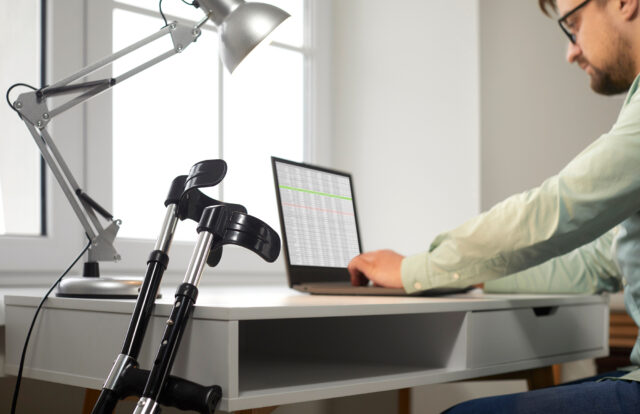
People with Disabilities Benefit from Rise of Remote Work
The surge in remote work sparked by the pandemic has opened up new job options to keep older Americans with disabilities employed until they’re ready to retire.
Remote work has inherent advantages for them, including easier commutes, flexibility, and access to a wider range of jobs. Older workers took full advantage of this during the pandemic, when telework and hybrid work arrangements took off.
From 2018 through 2022, the employment rate increased by 11.6 percent among people between ages 51 and 64 with disabilities due to an increase in employment in occupations that can accommodate telework, according to Siyan Liu and Laura Quinby at the Center for Retirement Research, which supports this blog.
Contrast that to stagnant employment during that time for disabled workers in occupations that are not amenable to remote work.
But are these gains real? After all, a tight labor market has helped everyone find work or a better situation. Workers with disabilities are no different. More people are also reporting they have so-called brain fog, a symptom of long COVID. The increase in employment among people with disabilities could, to some extent, reflect a shift to remote work by people who were already employed but developed this cognitive impairment.
However, even when the researchers accounted for these factors, the increase in the employment rate was still high, at 10.4 percent. “Remote work benefits older workers with disabilities by allowing them to re-enter the labor force and others to switch jobs instead of exiting work,” they concluded.
They investigated who in the disability population has benefited from this trend. People with prior experience working remotely, even though they had not been working recently, saw big employment gains. So did people who had already been employed, though not remotely, an indication they might’ve switched to a more flexible job that allowed them to work remotely.
The rise of remote work has clearly given older workers with disabilities more opportunities to keep working and extend their careers. Now that the pandemic is subsiding, it should become clear whether this will continue to be a a viable option for them.
To read this brief by Siyan Liu and Laura Quinby, see “Does Remote Work Help Older People with Disabilities?”
The research reported herein was derived in whole or in part from research activities performed pursuant to a grant from the U.S. Social Security Administration (SSA) funded as part of the Retirement and Disability Research Consortium. The opinions and conclusions expressed are solely those of the authors and do not represent the opinions or policy of SSA, any agency of the federal government, or Boston College. Neither the United States Government nor any agency thereof, nor any of their employees, make any warranty, express or implied, or assumes any legal liability or responsibility for the accuracy, completeness, or usefulness of the contents of this report. Reference herein to any specific commercial product, process or service by trade name, trademark, manufacturer, or otherwise does not necessarily constitute or imply endorsement, recommendation or favoring by the United States Government or any agency thereof.






